Shanghai Henlius Biotech Bundle
How Does Shanghai Henlius Biotech Stack Up in the Biopharma Arena?
The biopharmaceutical industry is booming, with projections soaring to nearly a trillion dollars by 2034. Shanghai Henlius Biotech, a rising star in this sector, has already carved out a significant niche with its focus on biosimilars and innovative biologics. But in a market this competitive, how does Henlius Biotech truly measure up?
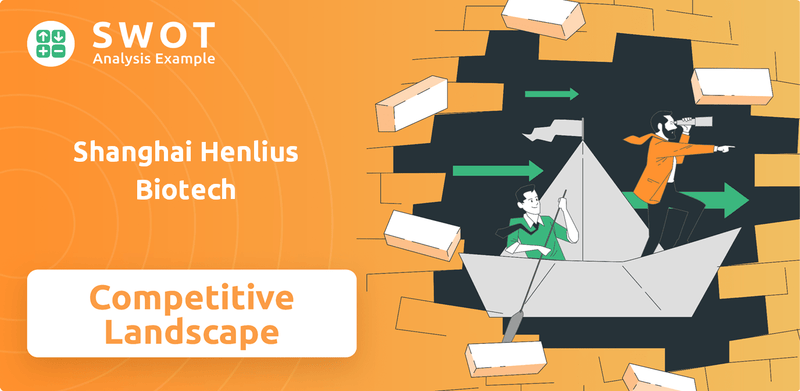
To understand Henlius Biotech's position, we delve into a comprehensive Shanghai Henlius Biotech SWOT Analysis, examining its financial performance, including its impressive 2024 profitability, and its strategic moves in the competitive landscape. This analysis provides critical insights into the company's market share, key competitors, and the factors driving its success in the dynamic biosimilar market in China and beyond. We'll also explore Henlius Biotech's product pipeline and global expansion strategy.
Where Does Shanghai Henlius Biotech’ Stand in the Current Market?
Shanghai Henlius Biotech focuses on the biopharmaceutical sector, specifically biosimilars and innovative biologics. The company's core operations revolve around developing, manufacturing, and commercializing these products, primarily targeting areas like oncology, autoimmune diseases, and ophthalmic diseases. This strategic focus positions Henlius to capitalize on the growing demand for affordable and effective treatments in these therapeutic areas.
The value proposition of Henlius lies in its ability to offer high-quality, cost-effective biosimilars and innovative biologics. This approach helps to improve patient access to critical medications. Through strategic partnerships and global expansion, Henlius aims to establish a strong presence in key markets, driving growth and enhancing its competitive position within the biopharmaceutical industry. For a deeper dive into the company's marketing strategies, consider reading the Marketing Strategy of Shanghai Henlius Biotech.
The global biosimilars market, a key segment for Henlius, was valued at approximately USD 34.8 billion in 2024 and is projected to reach USD 93.1 billion by 2030. Henlius Biotech's total product sales revenue reached approximately RMB 4.9335 billion in 2024, marking an 8.3% increase year-over-year. Core products significantly contributed to this revenue, with HANQUYOU (trastuzumab) alone generating RMB 2.8100 billion in sales in 2024.
Henlius has a growing global presence, with products approved in over 50 countries and regions across Asia, Europe, Latin America, North America, and Oceania. In February 2025, the company entered an agreement with Abbott Products Operations AG to commercialize five products across 69 countries and regions. This expansion is a key part of Henlius' strategy to increase its market share.
In 2024, Henlius achieved a net profit of RMB 820.5 million, a 50.3% year-over-year growth, with a net profit margin of 14.3%. This marks its second consecutive year of full-year profitability, demonstrating strong financial health. The company's R&D expenditure reached RMB 1.8405 billion in 2024, an increase of 28.4% year-over-year, indicating continued investment in its pipeline.
Henlius' product portfolio includes biosimilars and innovative biologics targeting oncology, autoimmune diseases, and ophthalmic diseases. The company plans to launch eight new products globally in the next four years. This robust pipeline supports Henlius' long-term growth strategy and strengthens its position in the competitive landscape.
Henlius' strategic initiatives include expanding its global presence, focusing on key markets, and investing in R&D. These efforts are aimed at enhancing its competitive advantages and achieving sustainable growth. The company's focus on biosimilars and innovative biologics positions it to capitalize on market trends.
- Strategic partnerships for commercialization.
- Focus on major markets like the U.S., EU, and Japan.
- Continued investment in research and development.
- Expansion of product portfolio through new launches.
Shanghai Henlius Biotech SWOT Analysis
- Complete SWOT Breakdown
- Fully Customizable
- Editable in Excel & Word
- Professional Formatting
- Investor-Ready Format
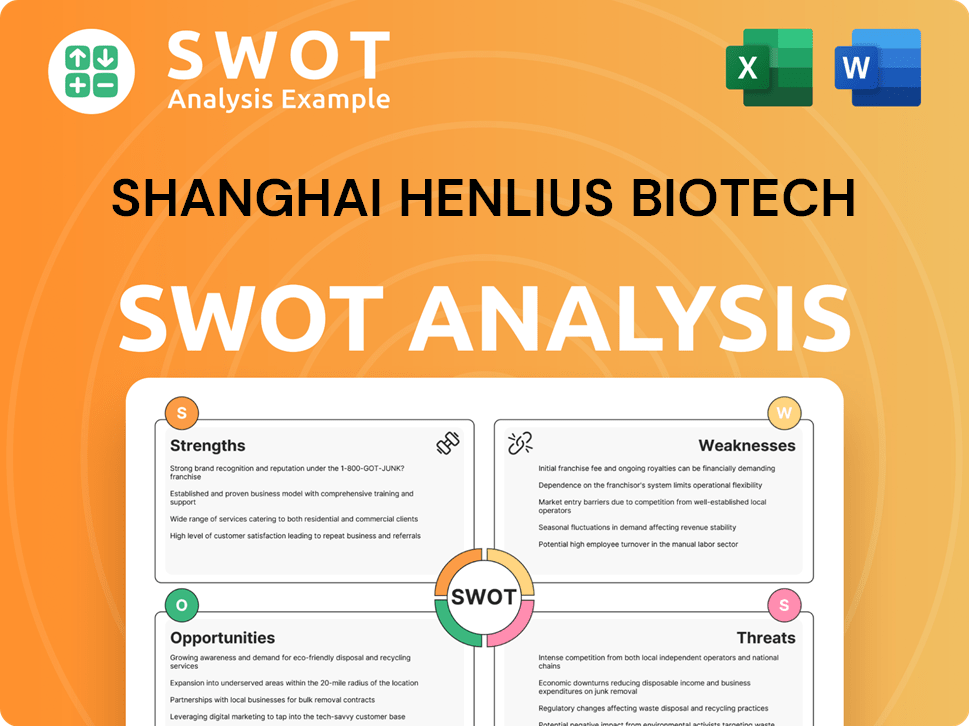
Who Are the Main Competitors Challenging Shanghai Henlius Biotech?
The Shanghai Henlius Biotech competitive landscape is complex, involving a mix of large, established pharmaceutical companies and emerging biotech firms. The company operates within the biopharmaceutical industry in Shanghai, facing competition in both the biosimilar and innovative biologics markets. A thorough Henlius Biotech market analysis reveals a dynamic environment shaped by global players and domestic rivals.
The Henlius Biotech competitive landscape includes major global pharmaceutical companies, biosimilar specialists, and rising domestic biotech firms. This competition affects Henlius Biotech's market share analysis and overall strategic positioning. Understanding these competitors is crucial for assessing Henlius Biotech's future outlook and potential for growth.
The biopharmaceutical industry in Shanghai is experiencing rapid growth, with several companies vying for market share. This competitive environment necessitates a detailed examination of Henlius Biotech's competitors and their strategies. The company's success depends on its ability to navigate this landscape effectively.
Major global pharmaceutical companies like Pfizer, Merck & Co., Johnson & Johnson, AbbVie, and AstraZeneca are significant competitors. These companies have vast resources and diverse portfolios, including oncology and autoimmune drugs. Merck & Co., for example, reported around $29.5 billion in sales from Keytruda in 2024.
The biosimilar market features established players such as Sandoz (Novartis), Samsung Bioepis, and Amgen, which are actively expanding their biosimilar portfolios. Other key participants include Biocon and Viatris, which have formed strategic alliances to boost biosimilar development. The Henlius Biotech's biosimilar product portfolio competes directly with these companies.
In China, Henlius Biotech is considered one of the four emerging biotech powerhouses, along with BeiGene, Innovent, and ZaiLab. BeiGene reported global revenue of approximately US$3.8 billion in 2024, highlighting the scale of domestic rivals. These companies benefit from China's large consumer base and streamlined regulatory processes.
Competitors employ various strategies to challenge Henlius. Global giants leverage extensive resources and established market presence. Biosimilar companies compete on price and speed to market. The competition around specific indications, such as trastuzumab biosimilars, involves multiple players. Understanding the competitive advantages of Henlius Biotech is crucial.
Oncology is a key therapeutic area for Henlius, where it faces significant competition from companies like Merck & Co. with Keytruda. The development of biosimilars targeting oncology drugs is another area of intense competition. The Henlius Biotech's product pipeline is crucial in this competitive landscape.
Impact of regulations on Henlius Biotech and other players is significant. Streamlined regulatory processes in China offer advantages to domestic companies. Global regulatory approvals are essential for international expansion. Henlius Biotech's global expansion strategy is influenced by these factors.
A comprehensive analysis of the competitive landscape involves evaluating each competitor's strengths, weaknesses, opportunities, and threats. This includes assessing their product pipelines, financial performance, and strategic partnerships. The Henlius Biotech's financial performance is directly impacted by these factors. The Henlius Biotech's strategic partnerships can provide a competitive edge.
- Market Share: Assessing the market share of each competitor in specific therapeutic areas.
- Product Pipelines: Comparing the number and stage of development of each competitor's products.
- Financial Performance: Analyzing revenue, profitability, and R&D spending of each competitor.
- Strategic Partnerships: Identifying collaborations and alliances that enhance competitive positioning.
- Manufacturing Capabilities: Evaluating the Henlius Biotech's manufacturing capabilities and those of its competitors.
Shanghai Henlius Biotech PESTLE Analysis
- Covers All 6 PESTLE Categories
- No Research Needed – Save Hours of Work
- Built by Experts, Trusted by Consultants
- Instant Download, Ready to Use
- 100% Editable, Fully Customizable
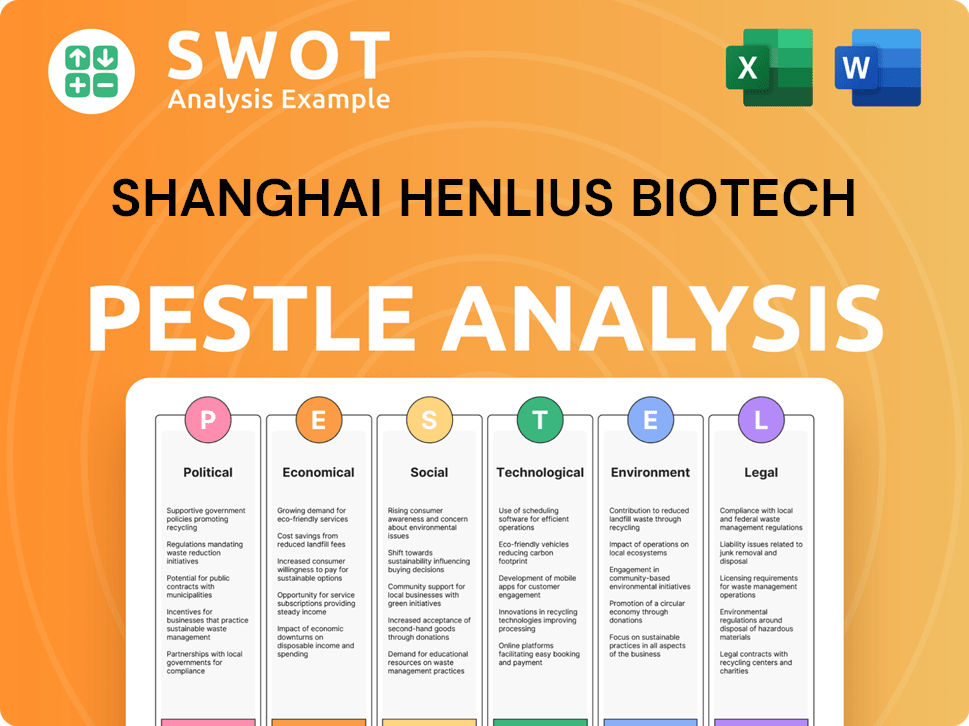
What Gives Shanghai Henlius Biotech a Competitive Edge Over Its Rivals?
Shanghai Henlius Biotech distinguishes itself in the competitive landscape through its integrated biopharmaceutical platform, robust research and development (R&D) capabilities, and strategic global expansion efforts. The company focuses on developing and commercializing high-quality, affordable biosimilars and innovative biologics. This approach addresses the rising costs of biologic drugs, making it a key player in the biopharmaceutical industry in Shanghai and beyond.
A core strength of Henlius is its comprehensive value chain integration, covering R&D, manufacturing, and commercialization. This integrated model allows for greater control over product quality and supply chain efficiency. The company's commitment to innovation is evident in its R&D expenditure, which reached RMB 1.8405 billion in 2024, marking a 28.4% year-over-year increase. This investment supports a diverse pipeline of approximately 50 molecules, including monoclonal antibodies (mAbs), antibody-drug conjugates (ADCs), and fusion proteins, targeting unmet clinical needs.
Strategic partnerships and a growing global footprint further enhance Henlius' competitive edge. The company has secured approvals for six products in China and four internationally, reaching over 50 countries and regions. Recent collaborations, such as the agreement with Abbott Products Operations AG in December 2024 and a licensing agreement with Dr. Reddy's in February 2025, demonstrate its commitment to expanding market access. These moves contribute to its competitive positioning in the biosimilar market in China and globally.
Henlius Biotech's significant R&D investment, reaching RMB 1.8405 billion in 2024, fuels its innovative pipeline. This investment supports the development of approximately 50 molecules, including mAbs and ADCs. The focus is on addressing unmet clinical needs, particularly in oncology and autoimmune diseases, strengthening its competitive advantages.
The company has a growing global presence, with approvals in over 50 countries and regions. Strategic partnerships, such as the collaborations with Abbott and Dr. Reddy's, enhance market access. These partnerships are key to its global expansion strategy and help to increase its market share.
Henlius has secured approvals for six products in China and four internationally, expanding its product portfolio. The company's innovative anti-PD-1 mAb, serplulimab (HANSIZHUANG), is the first in the world approved for first-line treatment of ES-SCLC. This highlights its strong position in the biosimilar market.
The Songjiang Facility received ISO 14001 and ISO 45001 dual certifications in 2024, demonstrating its commitment to quality. This enhances its global production and supply capabilities, ensuring the delivery of high-quality biologics. This commitment is crucial for its competitive positioning.
Henlius Biotech's competitive advantages stem from its integrated platform, robust R&D, and strategic global expansion. The company's focus on high-quality, affordable biosimilars addresses a significant market need. Its comprehensive value chain integration allows for greater control over product quality and supply chain efficiency.
- Integrated Biopharmaceutical Platform: From R&D to commercialization.
- Robust R&D Capabilities: RMB 1.8405 billion invested in 2024.
- Strategic Global Expansion: Approvals in over 50 countries and regions.
- Innovative Products: serplulimab (HANSIZHUANG) and HLX22.
- Strategic Partnerships: Collaborations with Abbott and Dr. Reddy's.
For further insights into the company's target market, consider reading about the Target Market of Shanghai Henlius Biotech. This comprehensive approach, combined with a patient-centric philosophy, positions Henlius to deliver high-quality, affordable biologics globally, solidifying its place in the competitive landscape.
Shanghai Henlius Biotech Business Model Canvas
- Complete 9-Block Business Model Canvas
- Effortlessly Communicate Your Business Strategy
- Investor-Ready BMC Format
- 100% Editable and Customizable
- Clear and Structured Layout
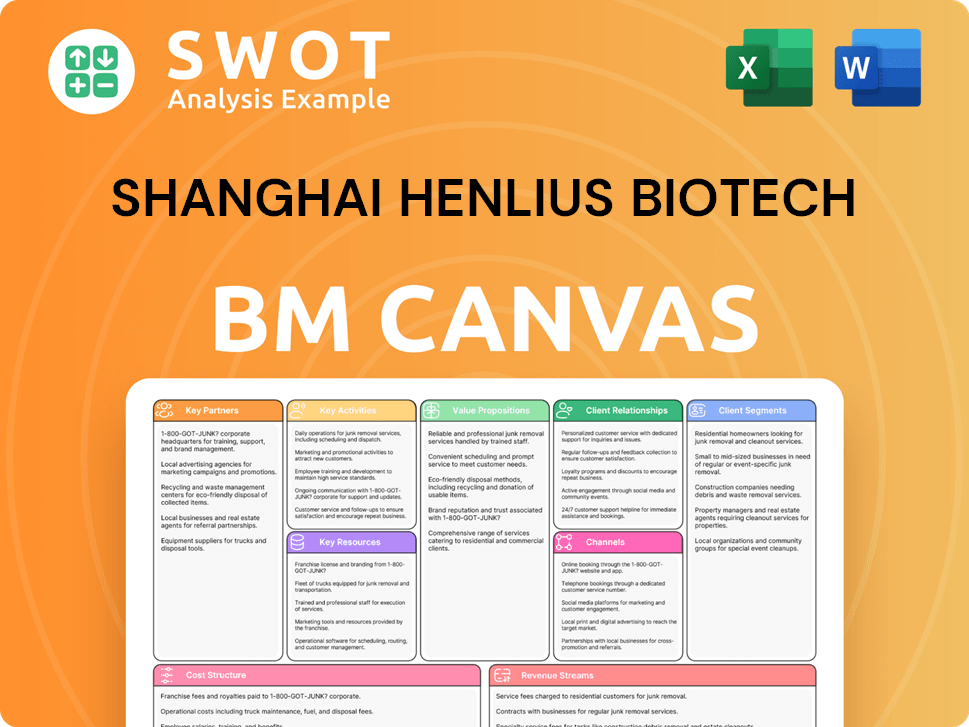
What Industry Trends Are Reshaping Shanghai Henlius Biotech’s Competitive Landscape?
The biopharmaceutical industry, including companies like Shanghai Henlius Biotech, is experiencing significant transformation, driven by technological advancements, evolving regulations, and changing healthcare needs. The competitive landscape for Henlius Biotech is shaped by global trends in drug discovery, biosimilar development, and strategic expansion. Understanding these dynamics is crucial for assessing Henlius Biotech's market position and future prospects. For a deeper dive into the company's ownership structure, consider exploring Owners & Shareholders of Shanghai Henlius Biotech.
The company faces both opportunities and challenges within this dynamic environment. The increasing use of artificial intelligence (AI) in drug development, the growth of the global biopharmaceutical market, and the expansion of biosimilars all create potential for growth. However, the looming patent cliff, rising clinical trial costs, and regulatory changes pose significant risks. Navigating these factors will determine Henlius Biotech's success in the coming years.
The biopharmaceutical industry is increasingly integrating AI, with projections that 30% of new drugs will be discovered using AI by 2025. The global biopharmaceutical market is expected to reach USD 921.5 billion by 2034. The oncology segment accounted for 30.9% of the market in 2024.
The patent cliff threatens over USD 300 billion in sales through 2030. Increasing clinical trial costs and complex regulatory requirements are significant challenges. Regulatory changes, such as the EU's Clinical Trials Regulation, will impact strategic planning. Changes at the FDA in 2025 may lead to slower regulatory decisions.
Precision medicine and personalized therapies are a major growth area. Expanding trials into emerging markets, like China, offers opportunities. The biosimilars market is projected to reach USD 93.1 billion by 2030. Henlius plans to launch eight new products globally in the next four years.
Henlius Biotech is leveraging AI to address unmet clinical needs and enhance innovation. The company is actively pursuing global expansion, aiming to become a top 20 company in Japan. Strategic partnerships and full value chain integration are key to the company's resilience and growth.
Henlius Biotech must navigate the evolving biopharmaceutical landscape by focusing on key areas. These include leveraging AI for drug discovery, expanding into emerging markets, and managing the challenges of the patent cliff.
- Prioritize investments in AI-driven drug discovery and development to improve efficiency and reduce costs.
- Strategically expand clinical trials and product launches in emerging markets, particularly China, to capitalize on growth opportunities.
- Develop robust strategies to mitigate the impact of the patent cliff, such as focusing on biosimilars and new product development.
- Foster strategic partnerships and collaborations to strengthen market position and access new technologies.
Shanghai Henlius Biotech Porter's Five Forces Analysis
- Covers All 5 Competitive Forces in Detail
- Structured for Consultants, Students, and Founders
- 100% Editable in Microsoft Word & Excel
- Instant Digital Download – Use Immediately
- Compatible with Mac & PC – Fully Unlocked
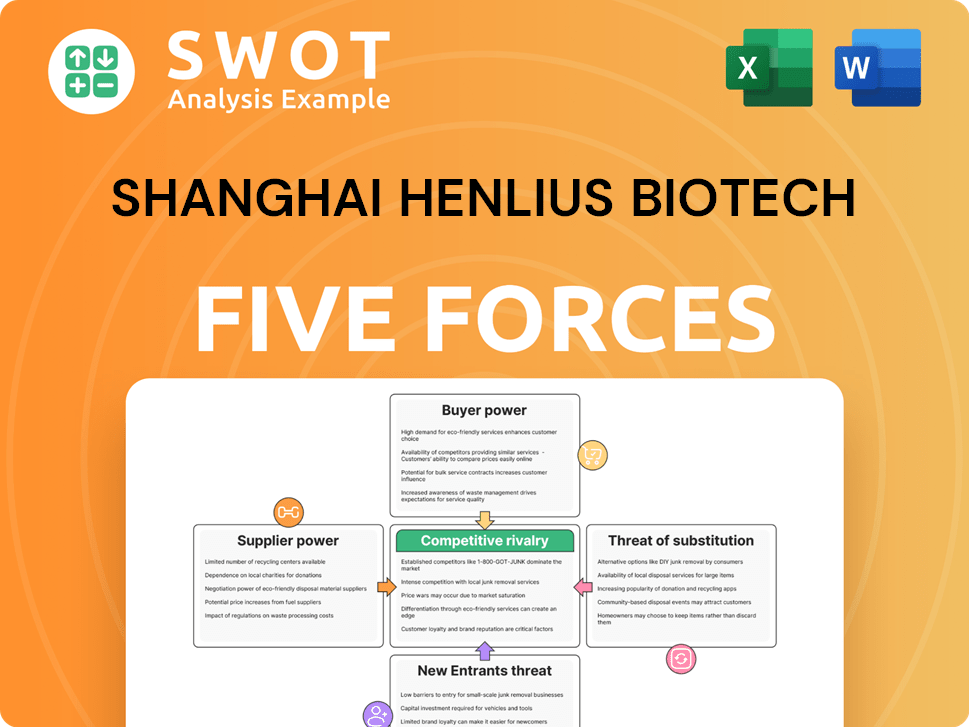
Related Blogs
- What are Mission Vision & Core Values of Shanghai Henlius Biotech Company?
- What is Growth Strategy and Future Prospects of Shanghai Henlius Biotech Company?
- How Does Shanghai Henlius Biotech Company Work?
- What is Sales and Marketing Strategy of Shanghai Henlius Biotech Company?
- What is Brief History of Shanghai Henlius Biotech Company?
- Who Owns Shanghai Henlius Biotech Company?
- What is Customer Demographics and Target Market of Shanghai Henlius Biotech Company?
Disclaimer
All information, articles, and product details provided on this website are for general informational and educational purposes only. We do not claim any ownership over, nor do we intend to infringe upon, any trademarks, copyrights, logos, brand names, or other intellectual property mentioned or depicted on this site. Such intellectual property remains the property of its respective owners, and any references here are made solely for identification or informational purposes, without implying any affiliation, endorsement, or partnership.
We make no representations or warranties, express or implied, regarding the accuracy, completeness, or suitability of any content or products presented. Nothing on this website should be construed as legal, tax, investment, financial, medical, or other professional advice. In addition, no part of this site—including articles or product references—constitutes a solicitation, recommendation, endorsement, advertisement, or offer to buy or sell any securities, franchises, or other financial instruments, particularly in jurisdictions where such activity would be unlawful.
All content is of a general nature and may not address the specific circumstances of any individual or entity. It is not a substitute for professional advice or services. Any actions you take based on the information provided here are strictly at your own risk. You accept full responsibility for any decisions or outcomes arising from your use of this website and agree to release us from any liability in connection with your use of, or reliance upon, the content or products found herein.